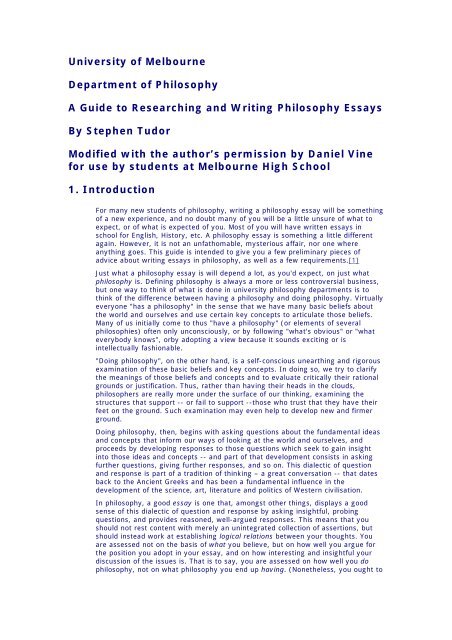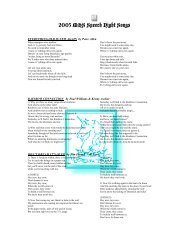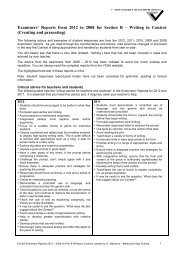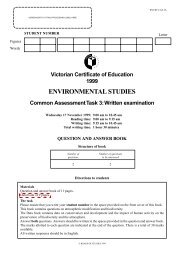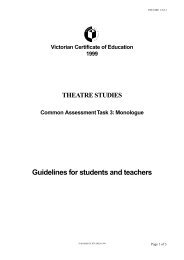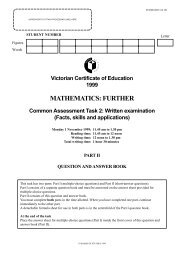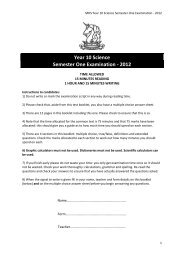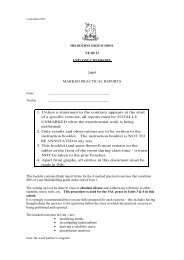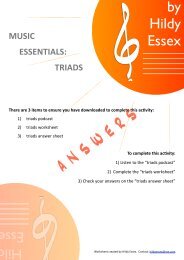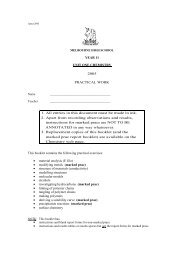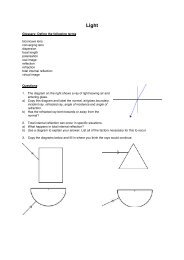Philosophy Essay Guide
Philosophy Essay Guide
Philosophy Essay Guide
Create successful ePaper yourself
Turn your PDF publications into a flip-book with our unique Google optimized e-Paper software.
University of MelbourneDepartment of <strong>Philosophy</strong>A <strong>Guide</strong> to Researching and Writing <strong>Philosophy</strong> <strong>Essay</strong>sBy Stephen TudorModified with the author’s permission by Daniel Vinefor use by students at Melbourne High School1. IntroductionFor many new students of philosophy, writing a philosophy essay will be somethingof a new experience, and no doubt many of you will be a little unsure of what toexpect, or of what is expected of you. Most of you will have written essays inschool for English, History, etc. A philosophy essay is something a little differentagain. However, it is not an unfathomable, mysterious affair, nor one whereanything goes. This guide is intended to give you a few preliminary pieces ofadvice about writing essays in philosophy, as well as a few requirements.[1]Just what a philosophy essay is will depend a lot, as you'd expect, on just whatphilosophy is. Defining philosophy is always a more or less controversial business,but one way to think of what is done in university philosophy departments is tothink of the difference between having a philosophy and doing philosophy. Virtuallyeveryone "has a philosophy" in the sense that we have many basic beliefs aboutthe world and ourselves and use certain key concepts to articulate those beliefs.Many of us initially come to thus "have a philosophy" (or elements of severalphilosophies) often only unconsciously, or by following "what's obvious" or "whateverybody knows", orby adopting a view because it sounds exciting or isintellectually fashionable."Doing philosophy", on the other hand, is a self-conscious unearthing and rigorousexamination of these basic beliefs and key concepts. In doing so, we try to clarifythe meanings of those beliefs and concepts and to evaluate critically their rationalgrounds or justification. Thus, rather than having their heads in the clouds,philosophers are really more under the surface of our thinking, examining thestructures that support -- or fail to support --those who trust that they have theirfeet on the ground. Such examination may even help to develop new and firmerground.Doing philosophy, then, begins with asking questions about the fundamental ideasand concepts that inform our ways of looking at the world and ourselves, andproceeds by developing responses to those questions which seek to gain insightinto those ideas and concepts -- and part of that development consists in askingfurther questions, giving further responses, and so on. This dialectic of questionand response is part of a tradition of thinking – a great conversation -- that datesback to the Ancient Greeks and has been a fundamental influence in thedevelopment of the science, art, literature and politics of Western civilisation.In philosophy, a good essay is one that, amongst other things, displays a goodsense of this dialectic of question and response by asking insightful, probingquestions, and provides reasoned, well-argued responses. This means that youshould not rest content with merely an unintegrated collection of assertions, butshould instead work at establishing logical relations between your thoughts. Youare assessed not on the basis of what you believe, but on how well you argue forthe position you adopt in your essay, and on how interesting and insightful yourdiscussion of the issues is. That is to say, you are assessed on how well you dophilosophy, not on what philosophy you end up having. (Nonetheless, you ought to
make sure that your essay's discussion is relevant to the topic. See Section 5(b)below on relevance).It is hoped that you enjoy the activity of essay writing. If you have chosen to studyArts, it is likely that you will have a particular interest in -- even a passion for --ideas and the variety of forms and genres in which ideas are expressed andexplored. The argumentative or discursive formal academic essay is one suchform, and one which can be a pleasure to read and to write. Thus, the assessmentthat is set in philosophy courses is primarily an invitation to you to pursue what isalready (or, hopefully, soon to be) your own interest in writing to explore ideas.However, your immediate goal in writing an academic philosophy essay ought notto be to write a personal testament, confession or polemic. Rather, you shouldprimarily aim at articulating, clearly and relatively dispassionately, yourphilosophical thinking on the topic at hand. Nevertheless, the kind and degree ofpersonal development one can gain from taking up the challenge to think and towrite carefully, clearly and thoroughly is certainly something to be greatly valued.The guidelines in this booklet are suggestions to help you get started in thebusiness of writing philosophy essays. As you practise your philosophical writingskills, you will develop your own technique, and learn what is appropriate in eachparticular case. So you may well come to "work around" many of these suggestedguidelines. Nonetheless, it is important that you passthrough that which you seekto pass beyond.[2] In addition to your own writing, your reading of otherphilosophers will help you to develop your sense of what constitutes goodphilosophical writing. As you read, note the various styles and techniques thatphilosophical authors employ in their treatment of philosophical issues. Practiceand studying good examples, then, are the most valuable ways to develop youressay writing skills.2. <strong>Philosophy</strong> <strong>Essay</strong> TopicsWhat do philosophy essays topics look like? There are, very roughly, two basickinds of philosophy essay topics: "text-focused" topics and "issue- or problemfocused"topics. Text-focused topics ask you to consider some particularphilosopher's writing on some issue. (E.g: "Discuss critically David Hume's accountof causation in Part III of Book I of his A Treatise of Human Nature" or "WasWittgenstein right to say that 'the meaning of a word is its use in the language', inhis Philosophical Investigations, Sec.43?"). Problem-focused topics are moredirectly about a particular philosophical issue, without reference to any particularphilosopher's text. (E.g: "Is voluntary euthanasia morally permissible?" or "What isscientific method?")There is another sort of topic, one which presents a statement and asks you todiscuss it, where that statement is a "made up" or, at least, unattributed quote.(E.g: "'Without belief in God, people cannot be moral'. Discuss.") I shall regardthese as variations of the problem-focused type of topic. Where you are asked todiscuss some such statement "with reference to" some specified text orphilosopher, then that topic becomes more text-focused. (E.g: "'Without belief inGod, people cannot be moral'. Discuss with reference to J.L. Mackie's Ethics:Inventing Right and Wrong") Occasionally, a topic presents an unattributedstatement, but the statement is, in fact, a quote from a particular philosopheryou've been studying, or, at least, a good paraphrase of their thinking. (Anexample of the latter: "'All the ideas in our minds originate from either senseperception or our reflection upon sensory information.' Discuss." -- in a coursedevoted to John Locke, whose views are summed up in the quoted statement,though those words are not actually his.) Should you take such topics as problemortext-focused? Rather unhelpfully, I'll say only that it depends on the case. (Youmight ask your lecturer or tutor about it.) Whichever way you do take it, be clearin your essay which way you are taking it.The difference between text-focused and problem-focused essay topics is,however, not very radical. This is because, on the one hand, any particular
philosopher's text is about some philosophical problem or question, while, on theother hand, most philosophical problems (certainly virtually all those you will begiven as essay topics at university) will have been written about by previousphilosophers.The basic way to approach text-focused topics, then, is to treat the nominated textas an attempt by one philosopher to deal with a particular philosophical problem orissue. The essay topic will, generally speaking, be inviting you to do philosophywith that philosopher, to engage with them in thinking about the issue, whetherthat engagement proves to be as an ally or an adversary. The chosen text willusually be one which has been (or deserves to be) influential or significant in thehistory of philosophy, but the task is not to pay homage to past masters. (But,even if homage is your thing, the best way to do that here is to engage with themaster philosophically.)With regard to problem-focused topics, you will often find your exploration of theproblem aided by taking some text or texts which have dealt with it as referencepoints or prompts. This is not always strictly necessary, but many of you startingout in philosophy will find it helpful to do so -- it can help you give focus to yourresponse to the question. (Thus, you might, in an essay on the topic "Is voluntaryeuthanasia morally permissible?" take it upon yourself to use, for example, RonaldDworkin's Life's Dominion and Peter Singer's Practical Ethics as reference points.Or, in an essay on the topic "What is scientific method?", you might set up youranswer via a comparison of the two different accounts in Karl Popper's The Logic ofScientific Discovery and Paul Feyerabend's Against Method.[3]) How will you knowwhich texts to adopt as reference points or prompts, if none is mentioned in theessay topic itself? The easiest (but not, thereby, necessarily the less respectable)way is to consider what texts have already been mentioned with regard to thetopic in your course reading guide and in classes. Another way is to do some ofyour own research. On this see Section 4 below.3. What do I do in a <strong>Philosophy</strong> <strong>Essay</strong>?<strong>Philosophy</strong> essay topics are not designed to provide an intellectual obstacle coursethat trips you up so as to delight a malicious marker. They are designed to inviteyou to "grapple with" with some particular philosophical problem or issue. That isto say, they are designed to offer you an opportunity to demonstrate yourunderstanding of a particular philosophical problem or issue, and to exhibit yourown philosophical skills of analysis, argumentation, etc. These twin goals areusually best achieved by ensuring that your essay performs two basic functions(your understanding and your skills apply to both):• an exposition of the problem or issue in question(often as it is posed in someparticular text); and• critical discussion of the problem or text.These two functions can, but need not always, correspond to physically orstructurally distinct sections of your essay. See Section 5(a) below.(a) ExpositionThe expository ("setting forth") aspect of your essay is where you should makeclear what the issue is and why it is an issue. Where you are dealing with an issueas it is presented in some particular text, your aim should be to make clear what itis that the author in question meant in their text, what they see as the issue andwhy they see it as an issue. This does not involve merely quoting or paraphrasinga text. Of course, occasional quotation and paraphrase may be appropriate --sometimes necessary -- but these ought not to constitute the sole or majorcontent of your exposition. Where you do quote or paraphrase, make sure youattribute your sources in footnotes or endnotes. (See Section 7 below.)
Exposition is, then, primarily a matter of developing in your own words what youthink the issue is or what you think the text means. In all expository work youshould always try to give a fair and accurate account of a text or problem, evenwhen the exposition becomes more interpretive rather than simply descriptive. Youought to be patient and sympathetic in your exposition, even if you intend later tocriticise heavily the philosopher in question. (Indeed, the better the exposition inthis regard, usually the more effective the critique.)An important part of exposition is your analysis of the text or issue. Here youshould try to "break down" the text, issue or problem into its constitutive elementsby distinguishing its different parts. (E.g: "There are two basic kinds of freedom inquestion when we speak of freedom of the will", or "There are three elements inPlato's conception of the soul, namely . . . . He establishes these three elements bymeans of the following two arguments . ..") This also involves showing therelationships between those elements, relationships which make them "parts of thewhole".As well as laying out these elements within a text or issue, you can also (whenappropriate or relevant) show how a text or issue "connects up with" other texts,issues, or philosophical and/or historical developments, which can help to shedfurther light on the matter by giving it a broader context.(E.g: "Freedom of the willis importantly connected to the justification of punishment", or "Plato's tripartitetheory of the soul bears interesting resemblances to Freud's analysis of thepsyche", or "Kant's transcendental idealism can be seen as reconciling thepreceding rationalist and empiricist accounts of knowledge".)An exposition of a text need not always simply follow the author's own view ofwhat it means. You should, of course, demonstrate that you understand how theauthor themself understands their work, but an exposition can sometimes gobeyond this, giving another reading of the text. (E.g: "Heidegger might deny it,but his Being and Time can be read as developing a pragmatist account of humanunderstanding.") A given text or issue may well be susceptible to a number ofplausible or reasonable interpretations. An exposition should aim to be sensitive tosuch variety. When appropriate, you should defend your interpretations againstrivals and objections. Your interpretation ought, though, to be aimed at elucidatingthe meaning or meanings of the text or issue and not serve merely as a "coathanger"for putting forth your own favoured views on the matter in question, whichshould be left to your . . .(b) Critical discussionThis is where your thought gets more of the centre stage. Here you should attemptto develop a response to the issues which your exposition has made clear, and/or,in the case of a discussion of some particular text, attempt to give a criticalappraisal of the author's treatment of the issue. In developing a response to aphilosophical problem, argumentation is, again, of central importance. Avoidmaking unsupported assertions; back up your claims with reasons, and connect upyour ideas so that they progress logically toward your conclusions. Consider someof the various objections to and questions about your views that others might orhave put forward, and try to respond to them in defence of your own line ofthinking. Your goal here should be to discuss what you have expounded so as tocome to some conclusion or judgement about it. ("Critical" is derived from theClassical Greek for "to decide, to judge".) Critical discussion is thus notnecessarily" destructive" or "negative"; it can be quite constructive and positive.In the case of a critical appraisal of a particular author's text, you can negativelycriticise the author's arguments by pointing out questionable assumptions, invalidreasoning, etc. If, on the other hand, you think that the text is good, then yourcritical discussion can be positive. This can be done by revealing its "hiddenvirtues" (that is, by showing that there is more to the author's arguments andviews than what lies on the surface) and/or by defending an author againstpossible and/or actual criticisms. (E.g: "Norman Malcolm argues that Descartes ismistaken in assuming that dreams and waking episodes have the samecontent.[4]However, Malcolm fails to appreciate the subtlety of Descartes'
argument in the First Meditation, which allows Descartes to claim . . .") Just toexpound an author's arguments and then say "I disagree" or "That seems right" isnot really enough -- you need to "have something to say" about it. Of course, byall means go on, after finding fault with some philosopher, to answer in your ownway the questions tackled or raised by the author.(E.g: "Simone de Beauvoir'sanalysis of women's oppression in The Second Sex suffers from seriousweaknesses, as I have shown above. A better way to approach the issue, I shallnow argue, is to . . .".)Where you are not primarily concerned with evaluating or responding to aparticular text, your critical discussion can be more focused on your ownconstructive response to the issue. (E.g: "Having used Dworkin's account to clarifythe meanings of the concepts of 'the sanctity of life' and 'voluntariness', I shall nowargue that voluntary euthanasia is morally permissible because its voluntarinessrespects what is of value in the notion of the sanctity of life" -- where you nowleave Dworkin behind as a source and move on to give your own account.)4. Researching Your <strong>Essay</strong>(a) ResearchTo research for your philosophy essay you need to do only two things: read andthink. (Actually, for problem-focussed essays, thinking is the only truly necessarybit, but it's highly likely that you will find your thinking much helped if you dosome reading as well.)What to read? It should be clear from your lectures and tutorials what somestarting points for your reading might be. (All courses provide reading guides;many also have booklets of reading material.) Your tutor and lecturer are alsoavailable for consultation on what readings you might begin with for any particulartopic in that subject. Independent research via catalogues and intelligent browsingof the relevant shelves can also uncover very useful sources, and evidence of thisin your essay is a pleasing sign of intellectual independence. (Make sure, though,that what you come up with is relevant to the topic. See Section 5 (b) below onrelevance.) Whichever way you proceed, your reading should be purposive andselective.In the case of essay questions that refer to a particular text, you should familiariseyourself thoroughly with this primary text. Texts on or about the primary text arecalled secondary texts, and can be helpful. However, don't think you will only everunderstand a primary text if you have a nice friendly secondary text to take you bythe hand through the primary text. More often than not, you need to have a goodgrasp of the primary text in order to make sense of the secondary text.How much to read? The amount of reading you do should be that which maximisesthe quality of your thinking -- that is, you should not swamp yourself with vastslabs of text that you can't digest, but nor should you starve your mind of ideas tochew over. There is, of course, no simple rule for determining this optimal amount.(Be wary, though, of falling into the vice of looking for excuses not to read somephilosopher or text, as in "Oh, that's boring old religious stuff" or "She's one ofthose obscure literary feminist types", or "In X Department they laugh at you ifyou mention those authors in tutes". If someone wants a reason not to think,they'll soon come up with one.)Most philosophical writings come in two forms: books or articles -- the latter beingeither in books that are edited anthologies or in philosophical journals, such asPhilosophical Quarterly or Australasian Journal of <strong>Philosophy</strong>. Most articles in thejournals are written by professional philosophers for professional philosophers, butby no means let this put you off. (Everyone begins philosophy at the deep end --it's really the only kind there is!) Similarly with many books. There are, however,many books written for student audiences. Some useful general reference works
include (and some of these would be prudent investments for beginners inphilosophy):• Paul Edwards, ed., The Encyclopedia of <strong>Philosophy</strong> (8 vols) (New York:Macmillan, 1967)• Robert Audi, ed., The Cambridge Dictionary Of <strong>Philosophy</strong> (Cambridge:Cambridge University Press, 1995)• Ted Honderich, The Oxford Companion to <strong>Philosophy</strong>, (Oxford: OxfordUniversity Press, 1995)• Simon Blackburn, The Oxford Dictionary of <strong>Philosophy</strong> (Oxford: OxfordUniversity Press, 1994)• J.O. Urmson and Jonathan Ree, eds., The Concise Encyclopedia of Western<strong>Philosophy</strong> and Philosophers, (London: Unwin Hyman, 1989)• A. R. Lacey, A Dictionary of <strong>Philosophy</strong>, 3rd ed (London: Routledge,1996)• Antony Flew, ed., A Dictionary of <strong>Philosophy</strong> (London: Pan,1984)(b) Note takingNote taking, like your reading, should not be random, but ought to be guided bythe topic in question and by your particular lines of response to the issuesinvolved. Note taking for philosophy is very much an individual art, which youdevelop as you progress. By and large it is not of much use to copy out reams oftext as part of your researches. Nor is it generally helpful to read vast numbers ofpages without making any note of what they contain for future reference. Butbetween these two extremes it is up to you to find the mean that best helps you ingetting your thoughts together.(c) LibrariesIn the MHS Library, the philosophical books are located (mostly) between 100-199in the Dewey decimal system.MHS also subscribes to two fine popular philosophical journals: <strong>Philosophy</strong> Nowand The Philosopher’s magazine. These are located in the magazine racks near thefront desk.Some useful works can also be found in the reference section of the library.5. Writing Your <strong>Essay</strong>(a) Planning and structuring your essayIt is very important that you plan your essay, so that you have an idea of what youare going to write before you start to write it. Of course, you will most likely alterthings in later drafts, but you should still start off by having a plan in mind.Planning your essay includes laying out a structure. It is very important that youressay has some discernible structure, i.e., that it is composed of parts and thatthese parts are logically connected. This helps both you and your reader to beclear about how your discussion develops, stage by stage, as you work through theissues at hand.Poor essay structure is one of the most common weaknesses in student philosophyessays, though it is skills such as structuring your thoughts for presentation toothers which should be amongst the more enduring things you learn in studyingArts. So, avoid the "domino" method of essay writing, whereby one writes onesentence, then another one that seems to follow that one, then another one thatseems to fit after that one, and so on until the requisite1500 words are up.
There are, of course, no hard and fast rules about how to structure a philosophyessay. Again, it is a skill you develop through practice, and much will depend onthe particular topic at hand. Nonetheless, it might be helpful to begin bydeveloping an essay structure around the basic distinction between your expositionand your critical discussion (as discussed above). In this it will be important thatyou make clear who is putting forward which point, that is, make it clear whetheryou are presenting your own thoughts or are expounding someone else's. (Again,this is a common problem-area.) It can often help your structuring if you provideheadings for different sections (possibly numbered or lettered). Again, this helpsboth your reader to follow your discussion and you to develop your thoughts. Ateach stage, show clearly the logical relations between and the reasons for yourpoints, so that your reader can see clearly why you say what you say and can seeclearly the development in your discussion.Another key to structuring your essay can be found in the old adage "Tell 'em whatyou're gonna tell 'em. Tell 'em. Then tell 'em what you've told 'em", which providesyou with a ready-made structure: Introduction, Main Body, and Conclusion.In your Introduction, first introduce the issues the essay is concerned with. Indoing so, try to state briefly just what the problem is and (if there is space) why itis a problem. (This also covers, of course, issues covered in text-focused essaytopics.) Next, tell the reader what it is that you are going to do about thoseproblems in the Main Body. This is usually done by giving a brief sketch oroverview of the main points you will present, a "pre-capitulation", so to speak, ofyour essay's structure. This is one way of showing your reader that you have agrasp (indeed, it helps you get a grasp) of your essay as a structured andintegrated whole, and gives them some idea of what to expect by giving them anidea of how you have decided to answer the question. (Of course, for reasons ofspace, your Introduction might not be very long, but something along these linesis likely to be useful.)In your Main Body, do what you've said you'll do. Here is where you shouldpresent your exposition(s) and your critical discussion(s). Thus, it is here that themain philosophical meat of your essay is to be found. Of course, what that meat isand how you will serve it will depend on the particular topic before you. But,whatever the topic, make clear at each stage just what it is you are doing. You canbe quite explicit about this. (E.g: "I shall now present Descartes' ontologicalargument for the existence of God, as it is presented in his Fifth Meditation. Therewill be three stages to this presentation.") Don't think that such explicitness mustbe too bland or the sign of an unsophisticated thinker.A distinct Conclusion is perhaps not always necessary, if your Main Body hasclearly "played out" your argument. So you don't always have to have a grandsummation and judgement at the end. Still, often for your own sake, try to state toyourself what it is your essay has achieved and see if it would be appropriate tosay so explicitly. Don't feel, by the way, that you must come up with earthshatteringconclusions. Of course, utter banality or triviality are not good goals,either. A good conclusion to a philosophy essay will usually combine a realisticassessment of the ambit and cogency of its claims with some plausible claim thatthose claims have some philosophical substance.(b) RelevanceWhat you write in your essay should always be relevant to the question posed.This is a common problem in student essays, so continually ask yourself "Am Iaddressing the question here?" First-class answers to a question can vary greatly,but you must make sure that your essay responds to the question asked, even ifyou go on to argue that the question as posed is itself problematic. (E.g: "To ask'What is scientific method?' presupposes that science follows one basic method.However, I shall argue that there are, in fact, several different scientific methodsand that these are neither consistent nor unified.") Be wary, however, of twisting atopic too far out of shape in order to fit your favoured theme. (You would be illadvised,for example, to proceed thus: "What is scientific method? This is aquestion asked by many great minds. But what is a mind? In this essay, I shalldiscuss the views of Thomas Aquinas on the nature of mind.")
This requirement of relevance is not intended as an authoritarian constraint onyour intellectual freedom. It is part of the skill of paying sustained and focusedattention to something put before you -- which is one of the most important skillsyou can develop at university. If you do have other philosophical interests that youwant to pursue (such as Aquinas on mind, amongst others), then we certainlyencourage you to pursue them, in addition to writing your essay on the set topic.(At no stage does the requirement of relevance prevent you from pursuing yourother interests.)(c) Citing philosophical "authorities"There might be occasions when you want to quote other philosophers and writersapart from when you are quoting a philosopher because they are the subject ofyour essay. There are two basic reasons why you might want to do this. First, youmight quote someone because their words constitute a good or exemplaryexpression or articulation of an idea you are dealing with, whether as itsproponent, critic, or simply its chronicler. (E.g: "As Nietzsche put it, 'There are nomoral phenomena at all, only a moral interpretation of phenomena'.[5]") You mayor may not want to endorse the idea whose good expression you have quoted, butsimply want to use the philosopher as a spokesperson for or example of that view.But be clear about what you think the quote means and be careful about what youare doing with the quote. (It won't do all the work for you.)The second reason you might want to quote a philosopher is because you thinktheir words constitute an "authoritative statement" of a view. Here you want to usethe fact that, e.g., Bertrand Russell maintained that there are two kinds ofknowledge of things (namely, knowledge by acquaintance and knowledge bydescription) in support of your claim that there are two such kinds of knowledge ofthings. However, be very careful in doing this, for the nature of philosophicalauthority is not so simple here. That is to say, what really matters is not thatBertrand Russell the man held that view; what matters are his reasons for holdingthat view. So, when quoting philosophers for this second reason, be careful thatyou appreciate in what exactly the authority lies -- which means that you shouldshow that you appreciate why Russell maintained that thesis. Of course, you can'tprovide long arguments for every claim you make or want to make use of; everyessay will have its enabling but unargued assumptions. But at least be clear aboutthese. (E.g: "For the purposes of this essay, I shall adopt Russell's thesis[6] that .. .".)(d) Examples<strong>Philosophy</strong> is by its nature a relatively abstract and generalising business.(Notethat abstraction and generality are not the same thing. Nor do vagueness andobscurity automatically attend them.) Sometimes a longish series of general ideasand abstract reasonings can become difficult for the reader (and often the writer)to follow. It can often help, therefore, to use some concrete or specific examples inyour discussion. Examples can be taken from history, current events, literature,and so on, or can be entirely your own invention. Exactly what examples youemploy and just how and why you use them will, of course, depend on the case.Some uses might be: illustration of a position, problem or idea to help make itclearer; evidence for, perhaps even proof of, a proposition; a counter-example; acase-study to be returned to at various points during the essay; a problem for atheory or viewpoint to be applied to.(Note that there can be different levels ofconcreteness and specificity in examples.) Again, be clear about what the exampleis and how and why you use it. Be careful not to get distracted by, or bogged downin, your examples. Brevity is usually best.(e) English expressionThere's another old saying "If you can't say what you mean, then you can't meanwhat you say", and this very much applies to philosophical writing. Thus, in writing
philosophically, you must write clearly and precisely. This means that goodphilosophical writing requires a good grasp of the language in which it is written,including its grammar and vocabulary. (See Section 9(c) below for advice for nonnativeEnglish speakers.)Having a mastery of a good range of terms, being sensitive to the subtleties oftheir meaning, and being able to construct grammatically correct and properlypunctuated sentences are essential to the clear articulation and development ofyour thoughts. Think of grammar, not as some old-fashioned set of rules oflinguistic etiquette, but rather as the "internal logic" of a sentence, that is, as therelationships between the words within a sentence which enable them to combineto make sense. This "intra-sentential logic" should work very closely with the"inter-sentential logic" of your essay, i.e., with the logical relations between yoursentences. (It's no good cementing your bricks together well if the bricksthemselves crumble; and it's no good having solidly made bricks if your cementcan't hold them together.) Attend closely, then, to each and every sentence youwrite so that its sense is clear and is the sense you intend it to have. Thinkcarefully about what it is you want each particular sentence to do (in relation toboth those sentences immediately surrounding it and the essay as a whole) andstructure your sentence so that it does what you want it to do.Good punctuation of a sentence should help to display its grammar. When readingphilosophers, attend closely to their sentence construction so as to be alive to allthe subtleties of the text. (E.g: think of the difference between "Plato stands as agreat philosopher, however he is criticised by modern thinkers." and "Plato standsas a great philosopher. However, he is criticised by modern thinkers.") A highstandard of writing skills is to be expected of Arts graduates. (Indeed, this sort ofskill will last longer than your memory of, for example, the three parts of thePlatonic soul -- though we hope some of the content of what you study will alsostick!) So use your time at university to develop these skills further. (It will beassumed that you can spell --which is not a matter of pressing the "spell-check"key on a word-processor.)A good dictionary and a thesaurus should always bewithin reach as you write your essay.If you are concerned to write not only clearly and precisely, but also with somedegree of grace and style (and we hope you are), it's still best to get the clarityand precision right first, in a plain, straightforward way, and then to polish thingsup afterwards to get the style and grace you want. But don't sacrifice clarity andprecision for the sake of style and grace – be prepared to sacrifice that beautifulturn of phrase if its presence is going to send your discussion off down an awkwardpath of reasoning. Aim to hit the nail on the head rather than make a loud bang.What you are likely to find, nonetheless, is that a philosophy essay which really isclear and precise will have a large measure of grace and style in its very clarityand precision.The need for clarity and precision in philosophical writing sometimes means thatyou need to stipulate your own meaning for a term. When you want to use aparticular word in a particular way for the purposes of your essay -- as a "technicalterm" -- be clear about it. (E.g: "In this essay, I shall intend 'egoism' to mean . ..") Also, be consistent in your technical meanings, or else note when you are not.(Be wary, though, of inventing too many neologisms or being too idiosyncratic inyour stipulations.)Things to avoid: waffle; vagueness; ambiguity; abbreviations (this guide I'mwriting isn't an e.g. of what's req'd. in a phil. essay); colloquialisms (which canreally get up your reader's nose); writing whose syntax merely reflects thepatterns of speech; unnecessary abstractness or indirectness; unexplained jargon;overly-rhetorical questions and other flourishes. Also, try to shorten and simplifysentences where you can do so without sacrificing the subtlety and inherentcomplexity of your thinking. Don't be fooled into thinking that obscurity is a sign ofprofundity. Nonetheless, don't be afraid of sometime essaying things which happento sound a little odd, if you think you have expressed your ideas just as theyshould be expressed. In expounding a text or problem that ultimately just isvague, muddled, or obscure, try to convey such vagueness, muddle or obscurityclearly, rather than simply reproducing it in your own writing. That is, be clear thatand how a text or problem has such features, and then perhaps do your best tomake matters clearer.
With regard to what "authorial pronoun" to adopt in a philosophy essay, it'sstandard to write plainly in the first person singular ("I", "me", "my", etc.)ratherthan use the royal "we" (as in "we shall argue that . . ."), or the convoluted quasilegalindirect form ("It is submitted that . . ."), or the scientific objectivity of aphysics experimental report. Nonetheless, stick closer to "I argue", " I suggest","my definition", etc., than to "I feel", "I wish", "I hate", etc. (A philosophy essay isstill something more intellectual and formal than a personal reminiscence, polemic,or proclamation.) In terms of audience, it's probably best to think of your readeras someone who is intelligent, reasonable, open to discussion, well-read, perhapsknows something about what you're writing about, but either is not quite clear ordecided on the matter, or needs convincing of the view you want to put forward, oris curious about what you think about the issues.We encourage you also to write using non-discriminatory language, that is,language which does not involve or imply inequality of worth between people onthe basis of sex, gender, race, ethnicity, sexuality, and so on. (Is it discriminatoryto lump the categories together here by using the words "and soon"?) As youwrite, you will be considering carefully your choice of words to express yourthoughts. You will almost always find that there are alternative ways to put thesame point by rephrasing your sentences.Some further writing and style guides you might like to consult include:• J.M. Williams, Style: Ten Lessons in Clarity and Grace, 4th ed. (New York:Harper Collins, 1994)• W. Strunk and E.B. White, The Elements of Style, 3rd ed. (New York:Macmillan, 1979)• J. Clanchy and B. Ballard, <strong>Essay</strong> Writing for Students: A <strong>Guide</strong> for Arts andSocial Science Students (Melbourne: Longman, 1981)• Australian Government Publishing Service, Style Manual for Authors,Editors and Printers, 5th ed. (Canberra: AGPS, 1995)• Robert Burchfield, ed., The New Fowler's Dictionary of Modern EnglishUsage (Oxford: Oxford University Press, 1996)• Pam Peters, The Cambridge Australian English Style <strong>Guide</strong> (Melbourne:Cambridge University Press, 1995)• S. H. Barton, Mastering English Grammar (London: Macmillan, 1984)And especially for philosophy students:• A. P. Martinich, Philosophical Writing, 2nd ed (Oxford: Blackwell,1996)• Robert Solomon, "Writing <strong>Philosophy</strong>", Appendix to his The Big Questions:A Short Introduction to <strong>Philosophy</strong>, 3rd ed. (San Diego: Harcourt, Braceand Jovanovich, 1990)(f) Vocabulary of logical argumentClosely related to the above points about English expression is the importance ofhaving a good grasp of what we can rather generally call "the vocabulary of logicalargument". These sorts of terms are crucial to articulating clearly and persuasivelya logical line of argument. Such argumentation will, of course, be of centralimportance in whatever discipline you are studying (indeed, in whatever sphere oflife that requires effective thinking and communication). I have in mind terms suchas these (grouped a little loosely):• all, any, every, most, some, none, a, an, the• that, this, it, he, she, they• if . . . , then. . . ; if and only if . . . , then . . . ; unless• either . . . or . . .; neither . . . nor . . .• not, is, are• therefore, thus, hence, so, because, since, follows, implies, infer,consequence
• moreover, furthermore• and, but, however, despite, notwithstanding, nevertheless, even, though,still• possibly, necessarily, can, must, may, might, ought, should• true, false, probable, certain• sound, unsound, valid, invalid, fallacious, supported• logical, illogical, reasonable, unreasonable, rational, irrational• assumption, premise, belief, claim, proposition• argument, reason, reasoning, evidence, proofMost of these are quite simple terms, but they are crucial in argumentative ordiscursive writing of all kinds. (Many are themselves the subject of study in logic, abranch of philosophy). The sloppy use of these sorts of terms is another commonweakness in students' philosophy essays. Pay close and careful attention to howyou employ them. Moreover, pay close and careful attention to how the authorsyou read use them. For further discussion of some of these terms and others, seethe booklet Basic Philosophical Vocabulary, available from the <strong>Philosophy</strong>Department Office for $2.50, as well as such introductory texts on logic as WesleyC. Salmon, Logic, 2nd ed(Englewood Cliffs, NJ: Prentice Hall, 1973), or AntonyFlew, Thinking About Thinking (London: Fontana, 1985).(g) Revising your essayIt is virtually essential that you write a first draft of your essay and then work onthat draft to work towards your finished essay. Indeed, several re-drafts may wellbe necessary in order to produce your best possible work. It is a rare philosopherindeed who can get things perfectly right on the first attempt, so be prepared tochange, alter, revise and re-develop what you write. Don't be too precious aboutwhat you have written, if it appears that it should be sacrificed in the revisionprocess. There is usually a very marked difference between essays which arebasically first draft rush-jobs done the night before they are due and those whichhave been revised and polished. Give yourself time to revise by starting writingearly on. Most philosophers will agree that the greater part of the work in essaywriting is in the writing, not in the preliminary researches and planning stages. Sobe wary of thinking "I've done all the work. I only need to write up my notes,which I can do the night before the essay's due". This is likely to lead to asleepless night and a weak, perhaps non-existent, essay.(h) Word limitStick to the word limit given for your essay (within, say, 10% of the limit, eitherabove or below). Why are word limits imposed? First, to give the markers a fairbasis for comparing student essays. Second, to give you the opportunity topractise the discipline of working creatively under constraints. Skill in this disciplinewill stand you in very good stead in any sphere where circumstances imposelimitations. Again, word limits are not constraints on your intellectual freedom.(See Section 5(b) above.) Outside your essay you are free to write without limit(but, even there, you'll probably find that your creativity is improved by workingunder a self-imposed discipline).As a general rule, most essays that fall well short of the word limit are weak orlazy attempts at the task, and most essays that go well over the limit are notmuch stronger or the result of much harder work -- the extra length is often due tounstructured waffle or padding which the writer hasn't thought enough about so asto edit judiciously. If you structure your essay clearly, you'll find it easier to reviseand edit, whether in order to contract or expand it. ("Hmm, let's see: section 2 ismuch longer than section 4, but is not as important, so I'll cut it down. And Ishould expand section 3, because that's a crucial step. And I can shift that thirdparagraph in the Introduction to the Conclusion.")
6. Plagiarism & Originality(a) PlagiarismPlagiarism is not tolerated, and is dealt with severely, always by awarding zeromarks for a plagiarised piece and usually with some other disciplinary action.Plagiarism is the knowing but unacknowledged use of work by someone other thanoneself (including work by another student) and which is being presented as one'sown work.Plagiarism can take a number of forms, such as:• copying: exactly reproducing another's words• paraphrasing: expressing the meaning of another's words indifferentwords• summarising: reproducing the main points of another's argument• cobbling: copying, paraphrasing or summarising the work of a number ofdifferent people and piecing them together to produce one body of text.None of these practices is wrong in itself, but when one or more is done withoutacknowledgment it constitutes plagiarism, and as such it will not be tolerated.Therefore, all sources must be adequately and accurately acknowledged infootnotes or endnotes. (See Section 7 below.)(b) OriginalityStudents sometimes worry about whether they will be able to develop "originalideas", especially in light of the fact that nearly every philosophical idea one comesup with seems to have been thought of before by someone from several centuriesago, if not 2500 years ago. There is no denying that truly original work inphilosophy is well rewarded, but your first aim should be to develop ideas that youthink are good and not merely different. If, after arguing for what you believe isright, and arguing in way that you think is good, you then discover that someoneelse has had the same idea, don't throw you work away -- you should feelvindicated to some extent that your thinking has been congruent with that ofanother (possibly great) philosopher.(If you have not yet handed your essay inwhen you make this discovery, make an appropriately placed note to that effect.)Don't be fooled, however, into thinking that plagiarism can be easily passed off ascongruent thinking. Of course, if that other philosopher's ideas have helped you todevelop your ideas, then this is not a matter of congruent ideas but rather ofderivative ideas, and this must be adequately acknowledged. If, after developingyour ideas, you discover that they are original, then that is an added bonus. Butremember that it is more important to be a good philosopher than an original one.7. Quotations, Footnotes, Endnotes, & Bibliography(a) QuotationsQuotations in your essay should be kept to a minimum. The markers know thecentral texts pretty well already and so don't need to have pages thereof repeatedin front of them. Of course, some quotation will usually be important and useful --sometimes essential -- in both exposition and critical discussion. When you domake quotations, you must make them clearly distinct from your own text, usingquotation marks, or, where the quoted passage is greater than 3 lines, in a
separate indented paragraph. In all cases, quotations must be given properreferencing in a footnote or endnote.Indirect quotations (e.g., "Descartes says that it is wise not to trust something thathas deceived us once before"[7]), paraphrases, summaries, and cobblings must besimilarly acknowledged as such, using footnotes or endnotes.(b) Footnotes and endnotesFootnotes appear at the foot of the page, clearly separated from the main body ofthe text, each one clearly numbered. Endnotes appear at the end of the essay,again clearly separated from the main body of text, numbered and headed"Endnotes" or "Notes". Either method is acceptable, but you should choose oneand stick with it throughout the one essay.Below are some examples of how to put the relevant referencing information infootnotes and endnotes. This is not intended as an exercise in pedantry, but as aguide to how to provide the information needed for adequate referencing. Thereason we provide this information is to enable our readers to find the sources weuse in order to verify them and to allow them to pursue the material further if itinterests them. (In your own researches you will come to value good referencing inthe texts you read as a helpful source of further references on a topic.) Again, it isthis sort of research skill that an Arts graduate will be expected to have mastered.There are a number of different conventions for writing up footnotes and endnotes.The <strong>Philosophy</strong> Department does not require that any particular convention befollowed, only that, again, you be consistent in your use of the convention that youdo choose. For other conventions see the style guides mentioned above, or simplygo to some texts published by reputable publishers and see what formats theyemploy.Imagine, then, that the following are endnotes at the end of your essay. I willexplain them below.ENDNOTES1. James Rachels, The Elements of Moral <strong>Philosophy</strong>, 2nd ed. (NewYork:McGraw-Hill, 1993), p.25.2. Philippa Foot, "Moral Relativism", in Michael Krausz and Jack W.Meiland,eds., Relativism: Cognitive and Moral (Notre Dame, Indiana:Universityof Notre Dame Press, 1982), p.155.3. Ibid.4. Ibid., p.160.5. Immanuel Kant, Groundwork of the Metaphysic of Morals, trans. H. J.Paton(New York: Harper and Row, 1964 [first German ed., 1785]), p.63.6. Thomas Hobbes, Leviathan, (London: Dent, 1973 [first pub. 1651]),p.65.7. Rachels, The Elements, p.51.8. Peter Winch, "The Universalizability of Moral Judgements", TheMonist 49(1965), p.212.Notes explained:1. This is your first reference to a book called The Elements ofMoral<strong>Philosophy</strong> . The title is given in full and in italics. If you areunable touse italics, then you should underline the title. The book'sauthor is JamesRachels. It's the 2nd edition of that book, which was publishedin New York,by the publishers McGraw-Hill, in 1993. The page you have referredto inyour main text is page 25.2. This is your first reference to Philippa Foot's article, "MoralRelativism", thetitle of which is put in "quotation marks". This articleappeared in a book(title in italics) which is an anthology of differentarticles, and which wasedited by Krausz and Meiland (names in full). The restis in the same styleas note (1).
3. "Ibid." is short for "ibidem", which means "in the same place" in Latin.Useit on its own when you want to refer to exactly the same work andpagenumber as in the previous note. So here the reference wasagain to Foot'sarticle at p.155.4. Ditto, except this time you referred to a different page in Foot'sarticle, viz.p.160.5. This is reference to a book by Kant. Same book details as per note(1),except that, because this is a translation, we include the translator'sname,6. This is a book reference again, so it's the same as note (1), exceptthat,because it's an old book, we include the date of the original edition.7. Here we are referring to Rachel's book again, but, because we are notinthe very next note after a reference to it, we can't use "ibid.". Simplygivethe author's surname and a short title of the book, plus pagereference. Thereis also a common alternative to this, whereby you give thesurname, and write"op. cit." (which is short for "opere citato", which isLatin for "in the workalready cited") and page reference. (i.e: Rachels, op.cit., p.51.) Yourreader then has to scan back over the notes to see whatthat "op." was exactly.The first (author plus short title) option is usuallyeasier on the reader.8. This is a reference to an article by Peter Winch in a journal calledTheMonist. The article's title is in "quotes", the journal title is initalics. Thevolume of the journal is 49, the year of publication is1965, the pagereferred to is p.212.(c) BibliographyAt the end of your essay (after your endnotes, if used) you should list in abibliography all of the works referred to in your notes, as well as any other worksyou consulted in researching and writing your essay. The list should be inalphabetical order, going by authors' surnames. The format should be the same asfor your notes, except that you drop the page references and should put surnamesfirst. So the bibliography of our mock-essay above would look like this:• Foot, Philippa, "Moral Relativism", in Michael Krausz and Jack Meiland,eds.,Relativism: Cognitive and Moral (Notre Dame, Indiana: University ofNotre Dame Press, 1982).• Hobbes, Thomas, Leviathan (London: Dent, 1973 [first pub.1651]).• Kant, Immanuel, Groundwork of the Metaphysic of Morals, trans.H.J.Paton(New York: Harper and Row, 1964 [first German ed. 1785]).Rachels, James, The Elements of Moral <strong>Philosophy</strong>, 2nd ed., (New York:McGraw-Hill, 1993).• Winch, Peter, "The Universalizability of Moral Judgements", The Monist49(1965)8. Presentation of <strong>Essay</strong>s(a) FormatThe MHS <strong>Philosophy</strong> Faculty has few specific requirements about the format inwhich you present your essay, only that it be legibly written, typed or wordprocessed,in English, on one side of pieces of paper that are somewhere in thevicinity of A4 size and are fixed together. You should use the Cover Sheet providedto record your name, the subject, the essay topic and your tutor's name. (Plasticfolders and suchlike presentational paraphernalia are not needed.)
It is prudent for you to make a copy of your essay for yourself before handing youressay in, just in case your essay is lost.)(b) Late essaysLate essays may be penalised at your teacher’s discretion.(c) <strong>Essay</strong>s not handed in<strong>Essay</strong>s not handed in get N/UG.9. Seeking AdviceTeachers<strong>Philosophy</strong> staff are not there just to be listened to by you; they are also there tolisten to you. So don't hesitate to contact your teacher to discuss questions orproblems you have concerning your work.10. A Bit on <strong>Philosophy</strong> Exams<strong>Essay</strong>s of the sort discussed so far in this booklet are not the only form ofassessment in the <strong>Philosophy</strong> Department -- exams are also set. What is to be saidabout them?First, not much that is different from what's been said above about philosophyessays. This is because what you write in a philosophy exam is none other than aphilosophy essay! The only basic difference is the matter of what constraints you'reworking under. <strong>Essay</strong>s have word limits; exams have time limits. Again, stick tothem. (Actually, you'll be made to stick to them by the exam invigilators.)It's best, then, to think, not about how many words to write on an exam essaytopic, but rather about how long to spend writing on it. Simple arithmetic will tellyou how much time to spend on each exam question. (E.g: if you have a2-hourexam and have to answer 3 questions, each worth one-third of the exam mark,then spend 40 minutes on each question.) Avoid the trap of "borrowing time" froma later question in order to perfect your answer to an earlier question, and thenworking faster on the later questions to catch up on lost time -- this is likely to getyou in a tangle. There are no word limits in philosophy exam essays, but don'tthink that the more you scrawl across the page, the more marks you'll get.Nonetheless, use the time you've got so as to maximise your display of yourphilosophical understanding and skills in answering the set question.Planning and structuring remain centrally important in exam essays. With regardto the niceties of footnotes, endnotes and bibliographies, etc., these are notnecessary -- so don't waste time on these. However, if you quote or refer toaspecific passage from a text, do indicate this clearly as such. If you have thereference handy, just put it briefly in the text of your exam essay. (E.g: "AsDescartes says in Meditation I (p.12), . . ." or "'[I]t is prudent never to trustcompletely those who have deceived us even once' (Descartes, Meditation I,p.12)".) Generally speaking, you will show your familiarity with any relevant textsby how you handle them in your discussion. (This is true for your non-examessays, also.)Bringing a text into the exam and reading it there for the first, or even second,time, is not a good idea. Your research for the exam should have been done beforeentering the exam hall. If you are properly prepared, you should not need to spendmuch time at all consulting texts or notes during the exam itself. Note that various
subjects have restrictions on what texts and other items can be brought into theexam hall.You won't have time for redrafting and revising your exam essay (which makesplanning and structuring your answers before you start writing all the moreimportant). If you do want to delete something, just cross it out clearly. Don'twaste time with liquid paper or erasers. Write legibly. Don't wr. "pointform" sav.time. Diff. kn. mean. use incomp. sent.Finally, read the instructions at the beginning of the exam paper. They areimportant. (E.g: It's not a good look to answer two questions from Part A, whenthe Instructions tell you to answer two questions, one from Part A and one fromPart B.) Note the (somewhat quaint) University policy of starting Reading Timesome time before the stated time for the exam. <strong>Philosophy</strong> exams usually have 15minutes of reading time. (Check for each of your exams.) So, if your examtimetable says the exam is at 2.15 pm, with reading time of 15 minutes, then thereading time starts at 2.00 pm and the writing time starts at 2.15pm-- so get tothe exam hall well before 2.00 pm. Reading time is useful. Use it to decide whichquestions you'll answer and to start planning your answers.• This third edition of "A <strong>Guide</strong> to Researching and Writing<strong>Philosophy</strong> <strong>Essay</strong>s" was, like the previous two editions dating backto 1991, written by Steven Tudor in consultation with interestedmembers of the <strong>Philosophy</strong> Department, University of Melbourne(including Linda Burns, Marion Tapper, Kimon Lycos,Brendan Long,Jeremy Moss, Tony Coady, Will Barrett, Brian Scarlett, and MeganLaverty). Some use was also made of materials prepared by the<strong>Philosophy</strong> Departments of La Trobe University and the AustralianNational University. © 1997 Steven Tudor.Checklist of Questions• Do I understand the essay question? Do I know when the essay is due?• Do I know which texts to consult? Do I know where to find them?• Have I made useful notes from my reading of the relevant texts?• Have I made a plan of how I'll approach the question in my essay?• Have I given myself enough time to draft and redraft my essay?• Have I written a clearly structured essay? Is it clear what each stage isdoing? Do I do what I say I'll do in my Introduction?• Have I clearly distinguished exposition and critical discussion? Have Igiven a fair and accurate account of the author(s) in question?• Is my response to the topic relevant? Do I answer the question? Have Ikept my essay within the general bounds of the topic?• Have I displayed a good grasp of the vocabulary of logical argument?Are my arguments logically valid and sound? Are my claims supported byreasons? Am I consistent within my essay?• Is my English expression clear and precise? Are my grammar,punctuation and spelling correct? Have I said what I meant to say? Is mywriting legible?• Have I fully acknowledged all my sources in footnotes or endnotes? Aremy quotations accurate? Have I included a bibliography?• Do I need to revise any part of my essay again?• Have I made a copy or photocopy of my essay for myself?• Have I kept the receipt for my handed-in essay?


